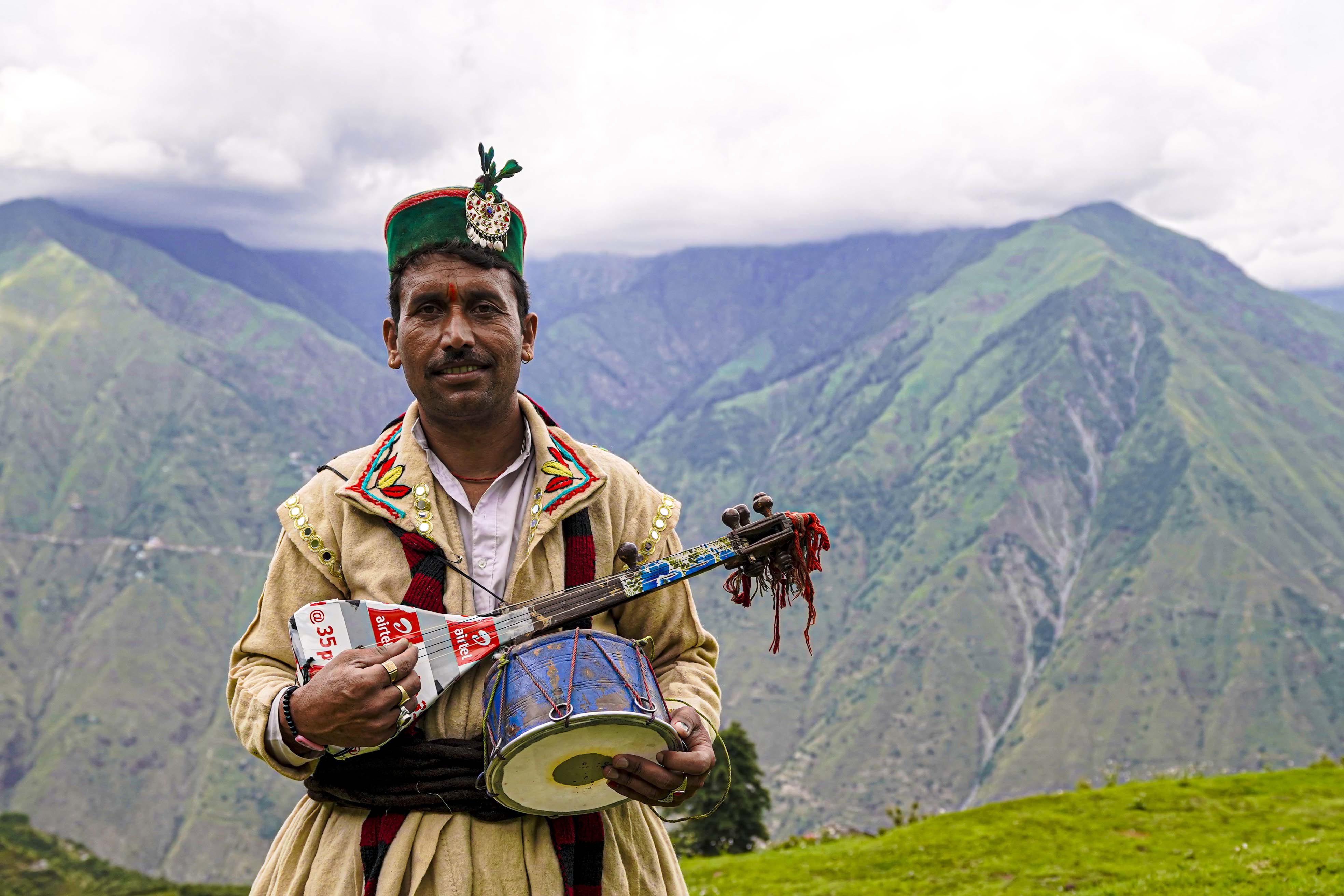
Phone: +91 9805726975
Group: Pawan and Nirmala
Pawan Kumar was born in 1981 in a village in Chamba, Himachal Pradesh. He is a Musada singer well known for singing religious songs during celebrations, weddings, and other cultural and religious celebrations and events in Chamba. Apart from singing, he works as a farmer and a mason to supplement his earnings from musical performance. He lives with his family in bharmour with his mother, his wife, three daughters, and son. His children are studying in a school in Chamba. He has a brother who works as a mason and a sister who is a homemaker and lives with her family in Chamba. During the summers he used to work as a farmer and graze his animals in the field in Bharmour. During winters the whole family shifts to Kangra where they have a different house to escape the snow and severe weather.
Pawan learned to sing at a very young age from his father. His whole family was into music and it was the only source of employment for them. He learned to play khanjri and ruvana from his guru, his uncle. He belongs to the Gaddi community. The people of the community were historically shepherds and used to graze sheep and cows in high altitude pastures of Himalayas. It is believed that a lot of compositions were made by people while grazing their animals. They are avid worshippers of Lord Shiva and their devotion is visible in their songs. The community has a rich culture, from bright costumes for both men and women to cultural festivals like Basua or Baisakhi, Minjar Mela, etc. His family is his inspiration which brought him into the world of music. During his childhood, he used to study in Mehla, where each Saturday, there were cultural programmes in the school. Pawan used to sing songs there and week by week he developed this love for singing. The reason why he sings is mainly for financial reasons. He found out that music could bring him money so he pursued this career. He wanted to do something else but somehow ended up becoming a singer. He left school and singing and did a few meager jobs but later was left with only music. He but very soon realized that he was built for this. Initially, he faced a lot of criticism but as it was the only thing which gave him money and relief, he worked hard and somehow managed to play and sing simultaneously. He mainly likes to sing bhajans and other religious songs depicting stories of Ramayana, Mahabharata, Shiv Purana. He also likes to sing bhajans of Lord Rama, Shri Krishna, Goddess Parvati and Lord Shiva. He also likes to compose and write songs as well. His inspirations for writing music is the lives of people. He critically watches the people around him, senses his emotions, i.e., how he feels and writes from his heart. He uses traditional musical instruments like Ruvana, Khanjari, and Ghungroo while Suman Ji uses Kansi. His ruvana is 60 years old and is made up of chir. He got it from his father and is one of his prized possessions. He believes that music and can’t imagine a world without it. He states the role of folk musicians in society that earlier they played an important role by teaching religious stories from Ramayana and Mahabharata which they learned from their parents and teachers. As only literate people could read religious texts and scriptures, folk musicians played an important role to teach the larger illiterate community. Today with the advent of television and internet, and people getting more educated they have access to every information let alone religious texts. So folk musicians have lost their significance but as music and musicians have a traditional value, musicians exist though less. Pawan talks about how he performs musada gayan. He has to learn the religious text, byheart it and rehearse it for days. On the day of musada, he sings songs overnight. One by one he sings each chapter of the religious epic. A chapter may long as long as 2 hours. After the end of each chapter, he has to explain the chapter and sermonize it. He performs mainly in weddings, festivals, childbirth celebration, janeyu celebration, and other necessary cultural rites celebration.
- Chamba
- Himachal Pradesh
